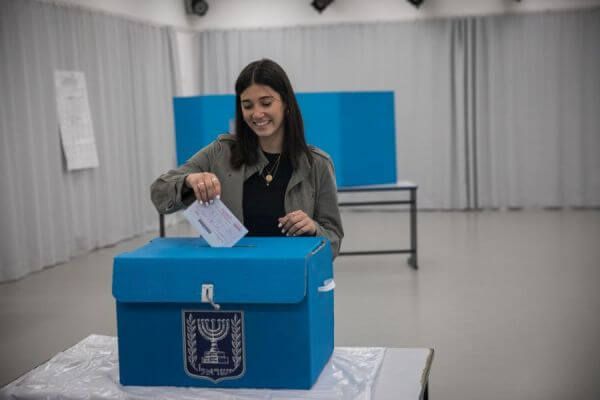How do Israeli elections work?
By law, national elections for the Knesset, Israel’s parliament, take place every four years, but the government does not serve for a fixed term. Early elections can be called by a majority vote of the Knesset or by presidential decree, usually if the government loses a vote of confidence or on the recommendation of the prime minister. Elections are set when a majority of the 120-seat house votes to dissolve itself.
Israel has a robust and firmly democratic election system, like all democracies, where the voice of the Israeli voters translates into the peaceful transfer of power to whoever wins the elections.
Join the fight for Israel’s fair coverage in the news
Electoral System
Israel uses a proportional representation electoral system called the ‘list system,’ in which voters cast their ballot for a particular political party. The number of seats a party gets is in proportion to the number of votes it received in the election. Therefore, if a party takes 10 percent of the vote it gains 12 of the 120 seats. There is a minimum threshold currently set by the Knesset at 3.25% of the popular vote in order to gain Knesset seats. Parties getting less than that do not get into the Knesset.
Before the general election, each party draws up and publicizes a list of candidates in order of preference. The top names on the list are the ones who are elected. That list remains in effect until the following elections. If a member of the Knesset dies in office or resigns, the next person on their party list is promoted to become a Knesset member.
All citizens from 18 years of age have the right to vote by secret ballot. There were approximately 6.4 million eligible voters for the September, 2019 elections of which roughly 20% belong to minorities.
In Israel there are just under 11 thousand polling stations, some four thousand are “accessible” voting stations for mobility-impaired voters.
Related reading: So Why Can’t the Palestinians Vote?
The Central Elections Committee
The key player in making Israeli elections work is the Central Elections Committee. This multi-party Knesset committee is presided over by a Supreme Court judge and it supervises many tasks including the authorization and registration of lists running for Knesset, the financing of elections, the organization and implementation of election day, the publication of election results, and appeals on the results.
Parties must register in advance with the Registrar of Political Parties, a department of the Ministry of Justice. There are currently around 90 political parties registered in Israel, not all of which are necessarily active.
For each election the CEC creates a new website with information in Hebrew, Arabic and English. For example, here is the CEC’s English language website for the November, 2022 vote.

The Voting Process
Israel does not have absentee voting, nor does it have advanced polls. Voters must be present in Israel on election day and physically cast their ballots at a polling station. The only exceptions for absentee voting is for sailors and diplomats; they cast their ballots on Israeli-flagged ships at sea and in Israeli foreign missions abroad one week early.
Voting always takes place on a Tuesday. On election day polls are open from morning until night and voting day is a national holiday with only workers in essential services (including public transportation) required to work.
Prior to the elections, all citizens had the opportunity to check and ensure that they were properly registered on the voters list.
Each citizen is assigned a specific polling station. When they arrive, they must present either their national identification card (called a teudat zehut in Hebrew) or a valid Israeli passport. Their identification is checked by representatives (scrutineers) from three different parties who confirm their identity and cross their name off the list of voters eligible to cast their vote at that polling station.

The voter is then given an envelope and goes behind a partition where they choose a slip of paper with the name and symbol of the party they are voting for from a display box containing slips for all of the parties running in the election. Large posters at each polling station list the names and symbols of each party, and polling station supervisors periodically inspect and make sure slips are available for all parties.
The voter then puts the slip into the envelope and puts it into the sealed ballot box in front of the election scrutineers.
At 10 PM, voting stops and the polling stations are locked. But the real Israeli election work is just beginning with the counting of the votes. A polling station supervisor and three monitors representing different political parties break the seal on the box, remove the envelopes and count the ballots – reporting the totals to the CEC.
During the night results are broadcast as polling stations report tallies to the CEC, and towards the morning the results become clearer with most poll results being announced before sunrise.
Although unofficial results are announced and published on the CEC website, the CEC publishes official election results within eight days following elections after ensuring there were no major irregularities and hearing any appeals.
Related reading: Here’s What Israeli Democracy in Action Looks Like
After the Election
Historically, no party in Israel has ever won 61 seats, so coalition governments are the norm.
After the CEC publishes the official results, the president usually asks the leader of the largest party considered best poised to form a government to begin putting together a coalition of at least 61 MKs. That party leader has 28 days, though the president customarily gives a 14-day extension if necessary.
If the leader of the largest party fails to form a coalition, the president can choose the leader of another party to do so. This was the case in the 2009 elections when then Kadima Party leader Tzipi Livni was unable to form a government despite having one more seat than the Likud Party, led at the time by Benjamin Netanyahu. Following the April 2019 elections, the president selected Netanyahu to form a government, but he failed to form a coalition and the Knesset decided to vote to dissolve itself and go to new elections, rather than have the president choose another party leader to form a government.
Related reading: 12 Things to Know About Israeli Elections and What Happens After
Generally, after 2-4 weeks of negotiations the president is approached with new government and a vote of confidence is held in the Knesset after which the government takes office.
Public Opinion Polls
Polling companies work overtime throughout the campaign to gauge public opinion. However, these polls are banned in the three days before the vote. On election day itself, news services may not begin releasing their own polls or begin forecasting results till after the polling stations close at 10 PM.
Like other democracies, Israeli voting society is split along right and left-wing ideologies. However, there are other major blocs including religious parties and predominantly Arab parties, all of whom have representatives in the Knesset. More recently, centrist parties have emerged in the Israeli political spectrum.
Liked this article? Follow HonestReporting on Twitter, Facebook, Instagram and TikTok to see even more posts and videos debunking news bias and smears, as well as other content explaining what’s really going on in Israel and the region.
New! Skip the social scroll and get the latest from HonestReporting via Telegram.
Featured image: Vectors by Freepik;
Before you comment on this article, please note our Comments Policy. Any comments deemed to be in breach of the policy will be removed at the editor’s discretion.

